Braindump2go New Published Microsoft 70-642 Dumps PDF Contanins the latest questions from Microsoft Exam Center! 100% Certification got guaranteed!
Vendor: Microsoft
Exam Code: 70-642
Exam Name: TS: Windows Server 2008 Network Infrastructure, Configuring
Keywords: 70-642 Exam Dumps,70-642 Practice Tests,70-642 Practice Exams,70-642 Exam Questions,70-642 Dumps,70-642 PDF,70-642 VCE,70-642 Study Guide

QUESTION 121
Your network contains a Windows Server Update Services (WSUS) server named Server1.
All client computers are configured to download updates from Server1.
Server1 ts configured only to synchronize manually to Microsoft Update.
Your company deploys a new Microsoft application.
You discover that the new application is not listed on the Products and Classifications list.
You synchronize the WSUS server.
You need to ensure that updates for the new application are available to all of the client computers.
What should you do? To answer, move the appropriate actions from the Possible Actions list to the Necessary Actions area and arrange them in the correct order.
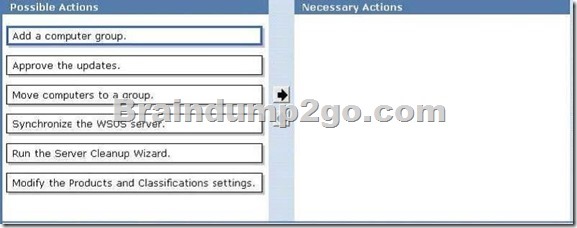
Answer:
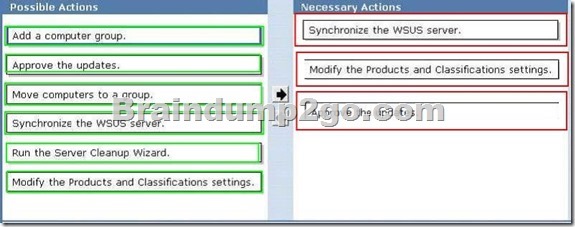
QUESTION 122
Your network contains an Active Directory domain.
The domain contains a server that runs Windows Server 2008 R2.
The server contains 10 shared folders.
You need to be notified by email when users save .mp3 files to the shared folders.
What should you do? To answer, move the appropriate actions from the Possible Actions list to the Necessary Actions area and arrange them in the correct order.
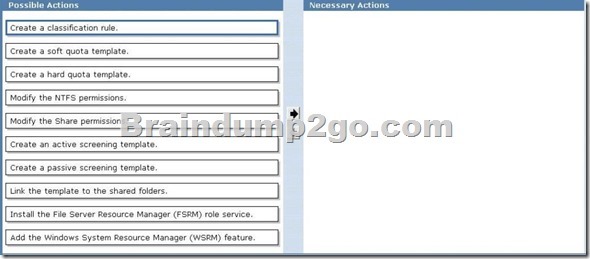
Answer:
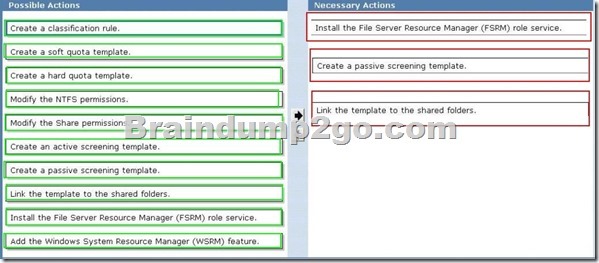
QUESTION 123
Your network contains a server that has the SNMP Service installed.
You need to configure the SNMP security settings on the server.
Which tool should you use?
A. Local Security Policy
B. Scw
C. Secedit
D. Services console
Answer: D
QUESTION 124
Your network contains a server named Server1 that runs Windows Server 2008 R2.
Server1 has the SNMP Service installed.
You perform an SNMP query against Server1 and discover that the query returns the incorrect identification information.
You need to change the identification information returned by Server1.
What should you do?
A. From the properties of the SNMP Service, modify the Agent settings.
B. From the properties of the SNMP Service, modify the General settings.
C. From the properties of the SNMP Trap Service, modify the Logon settings.
D. From the properties of the SNMP Trap Service, modify the General settings.
Answer: A
QUESTION 125
Your network contains an Active Directory domain.
All domain controllers run Windows Server 2008 R2.
The domain contains three domain controllers named DC1, DC2, and DC3.
All of the domain controllers have the DNS server role installed.
You create a new Active Directory-integrated DNS zone on DC1.
You need to ensure that the zone is only replicated to DC1 and DC3.
The solution must ensure that all zone replication traffic is encrypted.
What should you do? To answer, move the appropriate actions from the Possible Actions list to the Necessary Actions area and arrange them in the correct order.
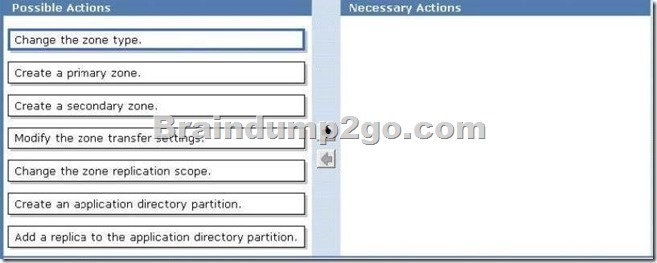
Answer:
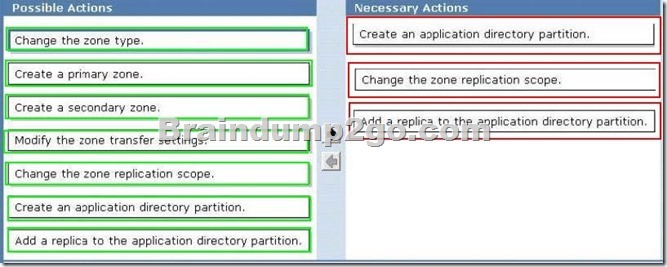
QUESTION 126
Your network contains a server named Server1 that runs Windows Server 2008 R2.
Server1 has the DHCP server role installed.
All client computer on the network obtain their network configurations from Server1.
You have a client computer named Computer1.
You need to configure Computer1 to use a different DNS server than the other client computers on the network.
What should you do? To answer , move the appropriate actions from Possible Actions list to the Necessary Actions area and arrange them in the correct order.
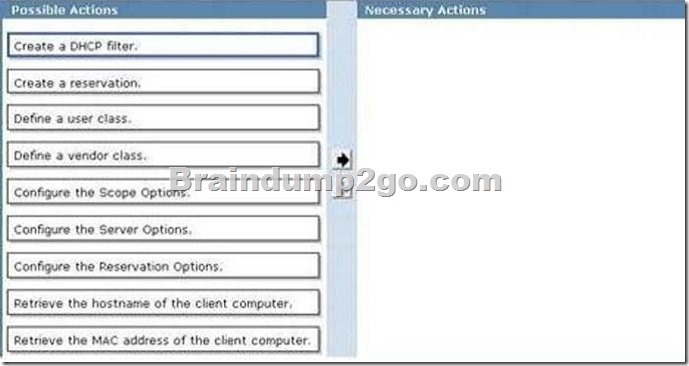
Answer:
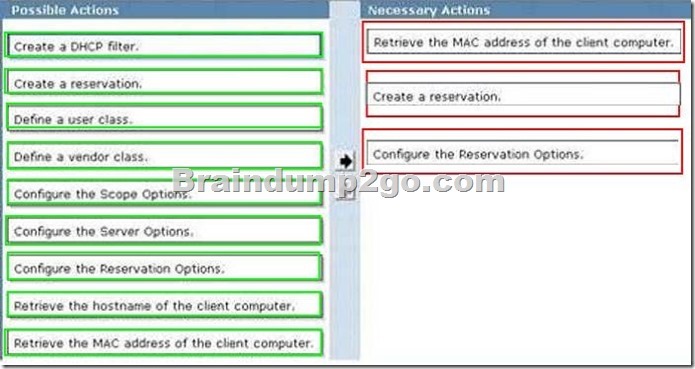
QUESTION 127
Your network contains a server that runs Windows Server 2008 R2.
You plan to create a custom script.
You need to ensure that each time the script runs, an entry is added to the Application event log.
Which tool should you use?
A. Eventcreate
B. Eventvwr
C. Wecutil
D. Wevtutil
Answer: A
Explanation:
You can create custom events in an event log by using the Eventcreate utility.
This can be useful as a diagnostic tool in scripts when you record an error or event directly into the logs without using VBScript or another language to log the event.
http://support.microsoft.com/kb/324145
QUESTION 128
You need to capture the HTTP traffic to and from a server every day between 09:00 and 10:00.
What should you do?
A. Create a scheduled task that runs the Netsh tool.
B. Create a scheduled task that runs the Nmcap tool.
C. From Network Monitor, configure the General options.
D. From Network Monitor, configure the Capture options.
Answer: B
Explanation:
nmcap /networks * /capture LDAP /file c:\file.cap
If you want a timer add the following
/startwhen /timeafter x hours
QUESTION 129
Your network contains a single Active Directory domain.
All servers run Windows Server 2008 R2.
A DHCP server is deployed on the network and configured to provide IPv6 prefixes.
You need to ensure that when you monitor network traffic, you see the interface identifiers derived from the Extended Unique Identifier (EUI)-64 address.
Which command should you run?
A. netsh.exe interface ipv6 set global addressmaskreply=disabled
B. netsh.exe interface ipv6 set global dhcpmediasense=enabled
C. netsh.exe interface ipv6 set global randomizeidentifiers=disabled
D. netsh.exe interface ipv6 set privacy state=enabled
Answer: C
Explanation:
Starting Windows Vista, Windows Server 2008 and Windows 7, to prevent address scans of IPv6 addresses based on the known company IDs of network adapter manufacturers, Windows by default generate random interface IDs for non-temporary autoconfigured IPv6 addresses, including public and link-local addresses. A public IPv6 address is a global address that is registered in DNS and is typically used by server applications for incoming connections, such as a Web server.
However, this can cause issues with some connection instances in which case you may need to disable this option.
To prevent Windows from using Random Identifiers,
1. Click Start-search “cmd”, right-click and choose “Run as Administrator”.
This should launch the command window withe elevated privileges.
2. Run the following command:
C:\windows\system32> netsh interface ipv6 set global randomizeidentifiers=disabled
At anytime later, you can enable this (if requierd) as follows:
C:\windows\system32> netsh interface ipv6 set global randomizeidentifiers=enabled
http://www.windowsreference.com/networking/disable-ipv6-random-identifier-in-windows-7-server-2008-vista/
QUESTION 130
Your network contains a server named Server1 that runs Windows Server 2008 R2.
Server1 has the Routing and Remote Access service (RRAS) role service installed.
You need to view all inbound VPN packets.
The solution must minimize the amount of data collected.
What should you do?
A. From RRAS, create an inbound packet filter.
B. From Network Monitor, create a capture filter.
C. From the Registry Editor, configure file tracing for RRAS.
D. At the command prompt, run netsh.exe ras set tracing rasauth enabled.
Answer: B
Want Pass 70-642 Exam At the first try? Come to Braindump2go! Download the Latest Microsoft 70-642 Real Exam Questions and Answers PDF & VCE from Braindump2go,100% Pass Guaranteed Or Full Money Back!
